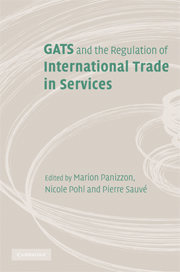Book contents
- Frontmatter
- Contents
- Contributors
- List of figures
- List of tables
- List of abbreviations
- Preface
- PART 1 Beyond regulatory control and multilateral flexibility: Gains from a cosmopolitan GATS
- PART 2 Unexplored economic, political and judicial dimensions of GATS
- PART 3 The limits of request–offer negotiations: Plurilateral and alternative approaches to services liberalisation
- PART 4 GATS case law: A first assessment
- PART 5 Market access, national treatment and domestic regulation
- PART 6 Unfinished business: Safeguard and subsidy disciplines for services
- 18 Recognition, standardisation and harmonisation: Which rules for GATS in times of crisis?
- 19 A safeguards regime for services
- 20 Waiting for Godot: Subsidy disciplines in services trade
- 21 Comment: One set of rules for fair and unfair trade in services: A possible merger?
- PART 7 Challenges to the scope of GATS and cosmopolitan governance in services trade
- PART 8 Conclusion
- Index
- References
18 - Recognition, standardisation and harmonisation: Which rules for GATS in times of crisis?
from PART 6 - Unfinished business: Safeguard and subsidy disciplines for services
Published online by Cambridge University Press: 03 September 2009
- Frontmatter
- Contents
- Contributors
- List of figures
- List of tables
- List of abbreviations
- Preface
- PART 1 Beyond regulatory control and multilateral flexibility: Gains from a cosmopolitan GATS
- PART 2 Unexplored economic, political and judicial dimensions of GATS
- PART 3 The limits of request–offer negotiations: Plurilateral and alternative approaches to services liberalisation
- PART 4 GATS case law: A first assessment
- PART 5 Market access, national treatment and domestic regulation
- PART 6 Unfinished business: Safeguard and subsidy disciplines for services
- 18 Recognition, standardisation and harmonisation: Which rules for GATS in times of crisis?
- 19 A safeguards regime for services
- 20 Waiting for Godot: Subsidy disciplines in services trade
- 21 Comment: One set of rules for fair and unfair trade in services: A possible merger?
- PART 7 Challenges to the scope of GATS and cosmopolitan governance in services trade
- PART 8 Conclusion
- Index
- References
Summary
Introduction
With the suspension of the multilateral trade negotiations in July 2006, discussions about the scope of future rules in the WTO framework may seem futile. Although formally the suspension concerns only the Doha Development Agenda (DDA) and WTO Members can always revive the negotiations, it is unlikely that new rules will be agreed upon in the near future. Instead of reducing scholarly interest in the scope and content of future rules, the current situation should stimulate reflection and discussion. In fact, without the straitjacket of ongoing negotiations and the necessity of commenting on existing negotiation proposals, academics should seize the opportunity to reconsider some aspects of the conventional wisdom of the WTO system and engage in a critical and radically different discourse about the future of the trading system.
This chapter aims to contribute to such an exercise with regard to a limited area of WTO law. It concerns the content and scope of future General Agreement on Trade in Services (GATS) rules, in particular whether and to what extent GATS should incorporate provisions on recognition, standardisation or harmonisation. Recognition, standardisation and harmonisation are advanced instruments of trade liberalisation which can already be found in some WTO agreements, notably the Agreement on Sanitary and Phytosanitary Measures (SPS) and the Agreement on Technical Barriers to Trade (TBT). The aim of these instruments is to reduce the trade-distorting effect of diverging domestic regulations in the territories of different WTO Members.
- Type
- Chapter
- Information
- GATS and the Regulation of International Trade in ServicesWorld Trade Forum, pp. 407 - 433Publisher: Cambridge University PressPrint publication year: 2008



